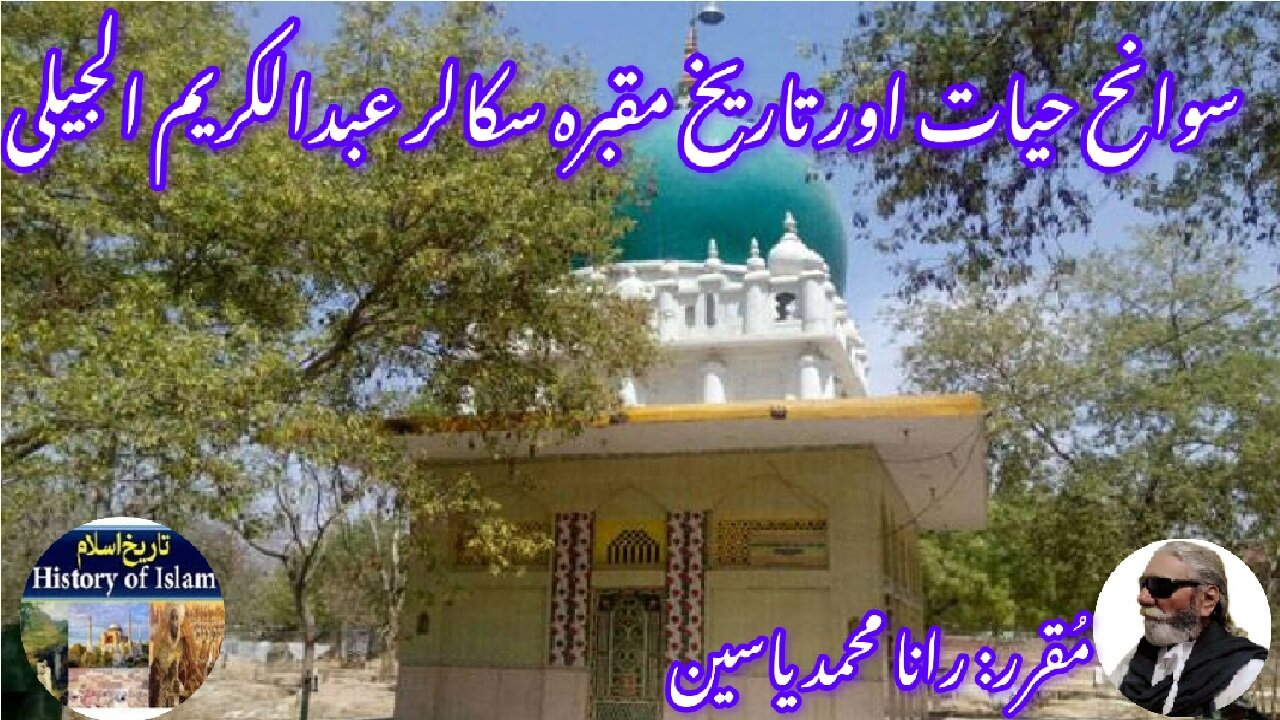Premium Only Content

Biography and tomb Abd al-Karim al-Jili | अब्द अल-करीम अल-जिली | سیرت اور مقبرہ عبد الکریم الجیلی
@islamichistory813 #SufiSaint #CulturalHeritage #IslamicMysticism #AbdalKarimalJili
Biography of Sufi Saint Abd al-Karim al-Jili
Dekhti Aankhooon aur sountay kaanoon ko Asslamoalaikum, sisters, brothers friends and elders, In this islamic scholars informative video, we are presenting the biography of Sufi Saint Abd al-Karim al-Jili, whose teachings have left a lasting impact on the Sufi tradition. The narrative encompasses his life, spiritual journey, and the philosophical principles he espoused. Furthermore, we examine the history of his shrine, including its geographical location and the cultural importance it holds for followers of Sufism. watch complete video and get to know the enduring legacy of this esteemed saint and the spiritual haven that commemorates his life.
Abd al-Karim al-Jili, a revered Muslim Sufi saint and mystic, was born in 1365 CE in Baghdad, Iraq, specifically in the neighborhood of Jil. This birthplace would later influence his surname, "al-Jili." As a descendant of the illustrious Sufi saint Abdul Qadir Gilani, founder of the Qadiriyya dervish order, al-Jili's spiritual heritage was deeply rooted.
Al-Jili's early life remains somewhat mysterious, but historians agree that he received a rigorous education in Islamic theology, jurisprudence, and Arabic literature. His ancestral ties to Abdul Qadir Gilani likely facilitated access to esteemed Sufi scholars and spiritual guides.
Al-Jili's thirst for spiritual knowledge drove him to travel extensively throughout the Middle East, North Africa, and Asia. He sought guidance from prominent Sufi masters, absorbing diverse perspectives and deepening his understanding of Islamic mysticism.
Al-Jili's writings profoundly impacted Sufi thought, with over twenty books to his credit. His magnum opus, "Universal Man" (Al-Insan al-Kamil), stands as a masterpiece of Sufi literature. This seminal work systematized and expanded upon Ibn Arabi's teachings on the structure of reality and human perfection.
As the foremost exponent of Ibn Arabi's philosophy, al-Jili's work provided a comprehensive framework for understanding the nature of existence, the unity of being (wahdat al-wujud), and the perfect human being (al-insan al-kamil).
Al-Jili's ideas have resonated throughout Muslim intellectual history, influencing scholars, mystics, and philosophers. His conception of the Absolute Being as a Self would later inspire 20th-century Muslim philosopher and poet Muhammad Iqbal.
Al-Jili passed away in 1424 CE, with some sources suggesting he died in Baghdad, while others indicate he may have died in Damascus or Cairo. His shrine is located in Baghdad's Al-Azamiyah district, near the Tigris River.
The shrine was built during the Ottoman Empire's reign, specifically during Sultan Suleiman the Magnificent's rule (1520-1566 CE). This revered site has undergone restoration and preservation efforts, ensuring its continued significance.
Today, Abd al-Karim al-Jili's teachings remain integral to Sufi philosophy, inspiring spiritual seekers worldwide. His work continues to bridge the gaps between theology, philosophy, and mysticism, reflecting the profound depth of Islamic spirituality.
Al-Jili's life and writings embody the essence of Sufism, emphasizing spiritual growth, intellectual rigor, and devotion. As a descendant of Abdul Qadir Gilani and a leading exponent of Ibn Arabi's thought, al-Jili's legacy solidifies his position as a pivotal figure in Muslim mysticism.
Through his seminal work, "Universal Man," al-Jili has left an indelible mark on Islamic intellectual history, influencing generations of scholars, mystics, and philosophers.
Sisters brothers friends, and elders, now give us permission, up to tomorow, and tomorow we will described Abu Al Fazal Abdul Wahid Yemeni Tamimi. Allah Hafiz
=======================
-
 17:36
17:36
ISLAMIC HISTORY
1 day agoIslamic History Episode 75 Martyrdom of Farooq Azam फारूक आज़म की शहादत واقعہ شہادت فاروق اعظم
81 -
 29:07
29:07
Rethinking the Dollar
2 hours agoTrump's Fed War Returns—Recession Incoming? | Morning Check-In
28K3 -
 LIVE
LIVE
LFA TV
16 hours agoACTIVE LIVE SHOOTER | TRUMP LIVE PRESSER! | ALL DAY LIVE STREAM 4/17/25
2,072 watching -
 1:28:13
1:28:13
The Shannon Joy Show
4 hours ago🔥🔥Could Trump’s Crackdown On Immigration Be A Trojan Horse For Martial Law & A Police State? Critical Conversation With Sheriff Richard Mack🔥🔥
37.3K6 -
 1:00:23
1:00:23
VINCE
6 hours agoThe Immigration Hill The Dems Will Die On | Episode 24 - 04/17/25
238K281 -
 DVR
DVR
Bannons War Room
1 month agoWarRoom Live
12.6M3.28K -
 1:19:07
1:19:07
Dear America
14 hours agoIllegals Over Americans: The Left’s True Agenda
151K93 -
 2:11:54
2:11:54
Matt Kohrs
16 hours agoBounce or Bust?! || The MK Show
87.5K3 -
 2:05:36
2:05:36
Badlands Media
12 hours agoBadlands Daily: April 17, 2025
82.5K18 -
 6:53
6:53
Talk Nerdy Sports - The Ultimate Sports Betting Podcast
4 hours agoEmotion is Dead: AI-Driven Carnage for April 17th
28.7K1